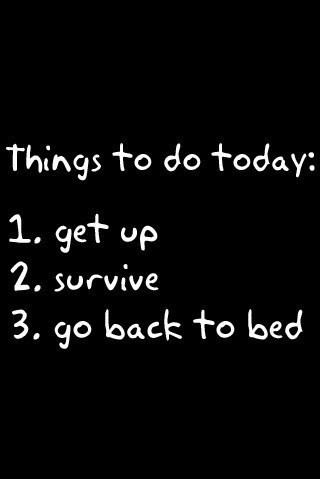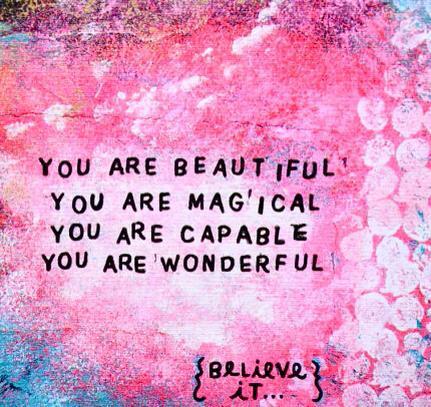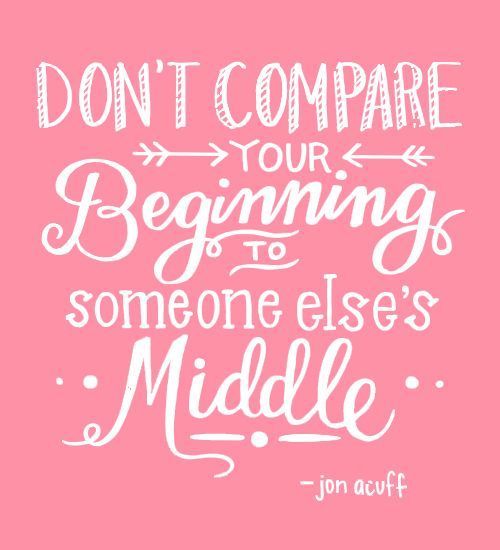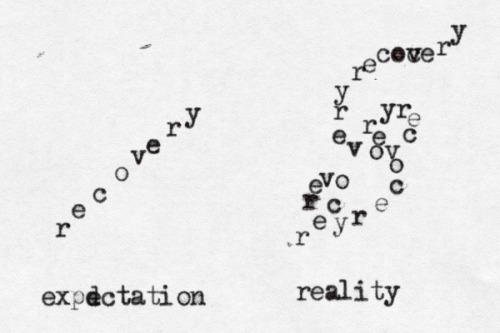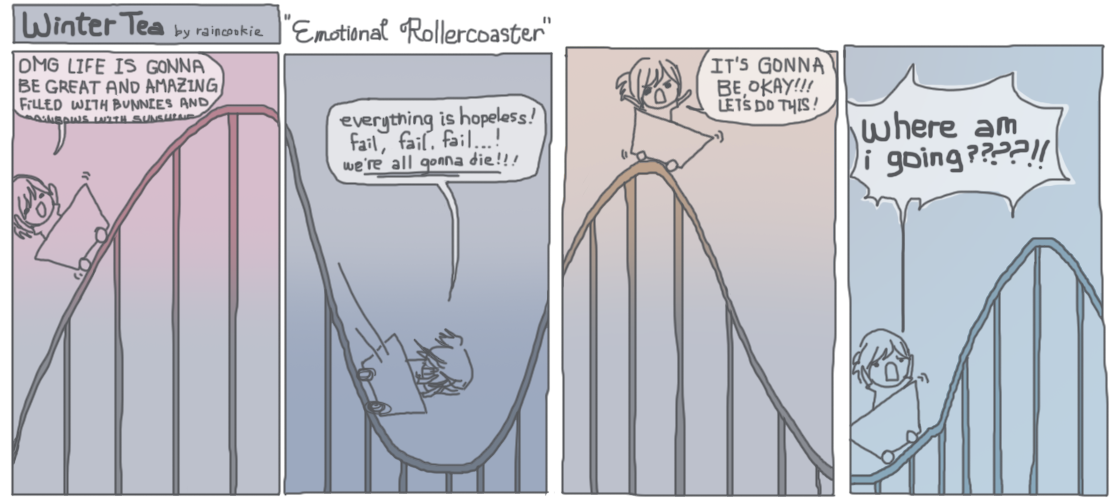I promised myself that I would blog about my first day of day treatment (from here on out, known as DTP). I promised myself that I would blog about Thanksgiving and how to survive it and have a super compilation of all of the articles I read about how to survive it if you have an eating disorder and how to support a loved one through Thanksgiving. And I did neither of those things.
My first day of DTP was a whirlwind, from which I went straight into a car for the five hour journey to Michigan, where Thanksgiving happened, then we made the five hour trek back home, and I completed my second day of DTP. So none of the blogging got done because well, DTP is exhausting and I was tired, and I also didn't have the interwebs in the car.
"By this point, I had long since accepted that I had a problem that could be called anorexia, although I didn't think I was thin enough to 'qualify' for the diagnosis. I was also quite happy to recover from my eating disorder, just as long as I didn't have to eat and gain weight."
--Carrie Arnold, Decoding Anorexia
I started reading Decoding Anorexia by Carrie Arnold last week sometime, and I have still to make it past the introductory chapter because I'm not sure right now is the time for me to read this book. The quote above has stuck with me ever since I read it the first time because that's exactly where my mind is right now. I have a foot in both camps--one is in the do-whatever-it-takes-to-recover camp, while the other remains in the I-like-the-idea-but-don't-want-to-eat/not lose-weight camp.
I keep having this discussion with people--from school, from treatment, from my team. And every single one of them finds it normal that I feel this way and normal that I feel conflicted at this stage. I mean, I currently have two competing ideologies in my head.
And I still don't completely understand how sick I am. I can look at the DSM and see how I fit the diagnosis of anorexia (Criterion B in the DSM: Intense fear of gaining weight. Check.), and I can be told again and again by doctors and therapists and friends and family that I am sick, and I think that I'm just finally becoming on board with that. I still have my moments though.
But recovery vs. continuing with my eating disorder? I don't know. I can still barely wrap my head around having an ED.
In DTP, the group leaders have both told me that this is perfectly normal and that acceptance and commitment to recovery will take time for me to develop, but that it will happen and that will be a big part of my recovery.
My doctor today told me that it is going to take time for my mind to get there. She said that as long as I continue to show up and do the hard work, it will get easier to want to recover. And she also said that it's completely okay to have one foot in the recovery camp and one foot in the not recovery camp, even if I'm only 51% in the first and 49% in the latter, as long as I'm letting that 51% win. And sometimes, my balance shifts and it becomes more like 50.00000001% in the recovery camp.
For days I have been feeling like the most insane person on the planet with all of these dissonant thoughts running around in my head. But today, I feel better because of DTP and because of the supportive staff that work there and I am so thankful for that.
So today, the day after what I'm renaming "Thankfulness Day" because it really is supposed to be about giving thanks, I'm going to turn my mind to the blessings that I have right now, in the chaos, in the uncertainty, in the hard times. And right now, in this moment...
I'm thankful to exist and to be alive;
I'm thankful for warm blankets and naps that bring rest and for knitting, and Criminal Minds to distract after a long few days;
I'm thankful for writing, for blogging, for journaling and for the outlet it gives me right now;
I'm thankful for family and friends who are supportive of my recovery journey;
I'm thankful for a house and loving parents to come home to;
I'm thankful for Gettysburg friends who have been sending love and encouragement, for administrators who have gone above and beyond the call of duty to help me with all the logistics (and to encourage me when I need it), for professors who are becoming more like family away from home and who continue to encourage and support from afar;
I'm thankful for my home community and for older and wiser friends, who I am now becoming close to because of my struggles;
I'm thankful for babies to snuggle and children to watch, for the reminder that life is precious and for the joy their presence brings to me;
I'm thankful for everyone I know who is struggling or has struggled with an ED--for my friends, for those I met and am meeting in treatment, for those I've met by being vulnerable about my own life, for those I've met at school and the NEDA Conference, for those who I blog-creep on--because every single one of these people make me feel less alone and give me a reason to fight my own ED;
I'm thankful for CCED and their staff who are supportive of my recovery and validating of my fears, who understand how overwhelming it is to "just eat" or to "just follow your meal plan," who care about every individual in DTP, who come to work every day with a smile and know exactly what to say to make me laugh, who give me a place of safety where I can be vulnerable and where people just get how I'm feeling;
And I'm thankful for the 50% of me in the recovery camp that gets me to actually go to treatment, because like my therapist continues to tell me, the best thing I am doing for myself right now is simply showing up.
My doctor today told me that it is going to take time for my mind to get there. She said that as long as I continue to show up and do the hard work, it will get easier to want to recover. And she also said that it's completely okay to have one foot in the recovery camp and one foot in the not recovery camp, even if I'm only 51% in the first and 49% in the latter, as long as I'm letting that 51% win. And sometimes, my balance shifts and it becomes more like 50.00000001% in the recovery camp.
For days I have been feeling like the most insane person on the planet with all of these dissonant thoughts running around in my head. But today, I feel better because of DTP and because of the supportive staff that work there and I am so thankful for that.
So today, the day after what I'm renaming "Thankfulness Day" because it really is supposed to be about giving thanks, I'm going to turn my mind to the blessings that I have right now, in the chaos, in the uncertainty, in the hard times. And right now, in this moment...
I'm thankful to exist and to be alive;
I'm thankful for warm blankets and naps that bring rest and for knitting, and Criminal Minds to distract after a long few days;
I'm thankful for writing, for blogging, for journaling and for the outlet it gives me right now;
I'm thankful for family and friends who are supportive of my recovery journey;
I'm thankful for a house and loving parents to come home to;
I'm thankful for Gettysburg friends who have been sending love and encouragement, for administrators who have gone above and beyond the call of duty to help me with all the logistics (and to encourage me when I need it), for professors who are becoming more like family away from home and who continue to encourage and support from afar;
I'm thankful for my home community and for older and wiser friends, who I am now becoming close to because of my struggles;
I'm thankful for babies to snuggle and children to watch, for the reminder that life is precious and for the joy their presence brings to me;
I'm thankful for everyone I know who is struggling or has struggled with an ED--for my friends, for those I met and am meeting in treatment, for those I've met by being vulnerable about my own life, for those I've met at school and the NEDA Conference, for those who I blog-creep on--because every single one of these people make me feel less alone and give me a reason to fight my own ED;
I'm thankful for CCED and their staff who are supportive of my recovery and validating of my fears, who understand how overwhelming it is to "just eat" or to "just follow your meal plan," who care about every individual in DTP, who come to work every day with a smile and know exactly what to say to make me laugh, who give me a place of safety where I can be vulnerable and where people just get how I'm feeling;
And I'm thankful for the 50% of me in the recovery camp that gets me to actually go to treatment, because like my therapist continues to tell me, the best thing I am doing for myself right now is simply showing up.


























